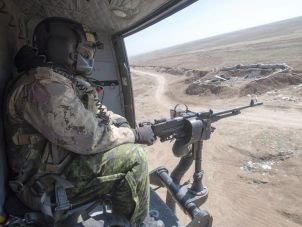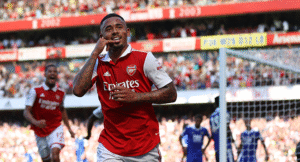
OTTAWA — The safety of Canadians in the Middle East is the government’s “paramount concern” following the death of a top Iranian general in an American airstrike, Foreign Affairs Minister Francois-Philippe Champagne said Friday.
Gen. Qassem Soleimani was the head of Iran’s elite Quds Force, and was killed in Baghdad, Iraq, late Thursday. U.S. President Donald Trump accused Soleimani of plotting to kill Americans, and the death has prompted a vow of “harsh retaliation” from Iran’s supreme leader.
Champagne said Canada remains in contact with its international partners.
“The safety and well-being of Canadians in Iraq and the region, including our troops and diplomats, is our paramount concern,” he said in a statement.
“We call on all sides to exercise restraint and pursue de-escalation.”
The airstrike was seen as a major escalation of tensions between the U.S. and Iran, though Trump insisted Friday he acted not to start a war but to stop one.
“We do not seek regime change, however the Iranian regime’s aggression in the region, including the use of proxy fighters to destabilize its neighbours, must end and it must end now,” he said.
Still, on Friday, the U.S. announced it was sending nearly 3,000 more troops to the Mideast, in the volatile aftermath of the killing, which Secretary of State Mike Pompeo defended as “wholly lawful.” He told Fox News Soleimani posed an “imminent” threat against the U.S. and its interests in the region.
Pompeo called world leaders Friday to explain and defend Trump’s decision to order an airstrike that has sparked fears of an explosion of anti-American protests and further destabilizing of the Middle East.
The State Department said Pompeo had spoken Friday with top officials in Afghanistan, Britain, China, France, Germany and Pakistan.
Defence Minister Harjit Sajjan said he spoke to his U.S. counterpart on Friday, and he is monitoring the situation.
“Our focus remains the safety of our troops and all Canadians in the region, and helping build a stable Iraq by preventing the re-emergence of Daesh,” he said, using the Arabic-language term for the Islamic State of Iraq and the Levant, or ISIS.
Up to 850 Canadian Forces are authorized for deployment in the region, with 200 of those in Iraq as part of the NATO mission there. They assist mostly in “behind-the-wire” training missions of Iraqi forces in the wake of the global campaign to oust ISIS from the area.
The Department of National Defence wouldn’t comment on what, if any, measures were being taken to protect them in light of the potential threat.
But a former foreign-policy adviser to the Canadian government says there are legitimate fears.
Retaliation from the general’s supporters is likely after the three-day mourning period ordered by Iran’s supreme leader, who considered Soleimani a son, said Shuvaloy Majumdar, a senior fellow with the Macdonald-Laurier institute.
“We can expect … there will be a wide range of asymmetric attacks against principally American assets but also quite possibly western ones,” Majumdar said.
“So I think that as we enter this new chapter, this is going to be a very significant question for how Canadians and the Canadian government respond to the security of our soldiers but also the advancing of our interests.”
Majumdar advised the former Conservative government on foreign policy for years, including on the decision to list Soleimani’s organization, the Quds Force, as a terrorist entity.
He called the leader’s death “the most consequential strike that has happened against a terrorist leader since the beginning of the so-called war on terror.”
“He oversaw a state-backed, industrial-scale, mechanized terrorism outfit that since the late 1990s, since he led the Quds Force, has become the most sophisticated terrorism (organization) the world has ever known.”
The Quds Force is part of Iran’s Revolutionary Guards, reporting to the country’s leader Ayatollah Ali Hosseini Khamenei. The Quds Force trains and equips foreign militias, carries out bombings and assassinations, and otherwise uses unconventional methods to expand Iran’s military and diplomatic influence. “Quds” is the Arabic and Persian name for Jerusalem.
The United States designated the Quds Force a terrorist organization in 2007. Canada followed suit in 2012.
“Canada has long been concerned by the Islamic Revolutionary Guard Corps’ Quds Force, led by Qassem Soleimani, whose aggressive actions have had a destabilizing effect in the region and beyond,” Champagne’s statement on Friday said.
The same U.S. strike that killed Soleimani also killed a leader in an Iranian-backed militia in Iraq, a sometime Iraqi politician and U.S.-designated terrorist known as Abu Mahdi al-Muhandis.
Late Friday, Conservative foreign-affairs critic Erin O’Toole and defence critic James Bezan sent out a joint statement calling on the government to declare Iran’s whole Revolutionary Guard Corps a terrorist organization, expanding the designation beyond the Quds Force.
“The IRGC’s Quds Force, led by Qassem Soleimani, was at the centre of IRGC operations and bear responsibility for violence, destruction and a destabilizing influence across the Middle East,” the statement said. It did not take a clear position on the strike that killed Soleimani.
NDP Leader Jagmeet Singh appeared to condemn the U.S. decision.
“The U.S.’s actions in Iran (sic) have brought us closer to another disastrous war in the Middle East,” he said in a statement on Twitter.
“The prime minister needs to act quickly with other countries to de-escalate the situation and not be drawn into the path that President Trump is taking.”
What role Canada could play is unclear.
Under the Conservatives, Canada cut off diplomatic ties with Iran. There was a limited effort to resurrect them under the Liberal government, to little effect. The Liberals’ relationship with the Trump administration is mixed.
Still, Canada has a stake in the region and must work with other allies in similar positions, said Younes Zangiabadi, the research director for the Iranian-Canadian Congress.
Iran has been arming itself for decades, and while some may cheer Soleimani’s death, he was a hero to many Iranians and his killing will unite the country against the West and in favour of further action on the part of the Iranian regime, Zangiabadi said.
“This is not going to go lightly,” Zangiabadi said.
This report by The Canadian Press was first published Jan. 3, 2020.
–with files from The Associated Press







